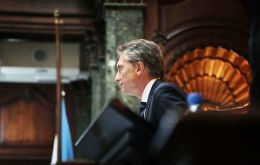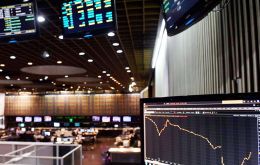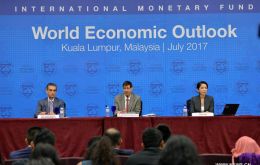MercoPress. South Atlantic News Agency
Tag: IMF
-
Sunday, May 20th 2018 - 13:15 UTC
Venezuela: Proselytism, pro-government advantage and hunger on the eve of the presidential election; the crisis gets worse

A few hours before the presidential election of May 20 in Venezuela, which is not recognized by dozens of countries in the region and is classified as “fraud” by the opposition of that country, official statements and messages favorable to the candidate and current president , Nicolás Maduro, have flooded the programs of the open media in Venezuela, according to a report by the Press Institute and Venezuela Society (IPYS).
-
Wednesday, May 16th 2018 - 09:09 UTC
Argentina seems to have managed Tuesday's challenge, but what comes next?

Argentina’s central bank on Tuesday rolled over billions of dollars in short-term debt, providing President Mauricio Macri’s government with a shot of confidence after weeks of economic volatility. In a statement, the Argentine central bank said it refinanced all of the US$ 26 billion of peso-denominated short term bonds that matured on Tuesday. Investors were attracted by renewal rates of 40% for 36-day Lebac and 38% and 38,5% for 90 days and plus, Lebacs.
-
Monday, May 14th 2018 - 08:20 UTC
The Economist: Will Argentina's woes spread?

Argentina has much in common with yesterday's emerging markets, but little in common with today's
-
Thursday, May 10th 2018 - 08:20 UTC
Argentine congress passed capital market reform bill; Merval up 6%

The Argentine Congress passed the government's capital markets reform bill on Wednesday, seeking to boost a troubled economy by reducing the power of market regulators and loosening restrictions on some funds investing in Argentina. Investors and economists consider the reform bill key to President Mauricio Macri's effort to boost investment in the country, whose capital markets are far smaller than regional peers.
-
Wednesday, May 9th 2018 - 20:19 UTC
US Dollar rises: Uruguay behind Argentina

After several days up in Argentina, the devaluation of the Argentine peso and the rise of the US dollar have had some impact on the other side of the River Plate, where the exchange houses of downtown Montevideo marked on Wednesday the value of the currency up to 31,70 Uruguayan pesos per dollar, a rise of 2.08% compared to Monday —the highest in five years—. For the Uruguayan government, the country follows the global trend and calls for calm, beyond the noise generated in Argentina, which is beginning a dialogue between the Finance Minister, Nicolás Dujovne, and the International Monetary Fund (IMF) in Washington.
-
Tuesday, April 24th 2018 - 08:42 UTC
Brazil poised for historic oil boom

By Mathew Smith<br />
<br />
After being caught up in major corruption scandals and suffering from what some have claimed was its worst economic downturn in 100-years, Brazil has pulled itself back from the brink. The economy commenced growing again in 2017 with gross domestic product (GDP) expanding by 1 percent and 2018 GDP growth forecast by the International Monetary Fund (IMF) to be 2.3%. -
Monday, April 23rd 2018 - 08:37 UTC
Speed of recovery, the main debate on the Brazilian economy

Brazil's policy makers welcomed an upward revision of the country's growth by the International Monetary Fund, while downplaying the fact its estimate remains lower than others.
-
Wednesday, February 21st 2018 - 01:26 UTC
Petro, the Venezuelan cryptocurrency is online

The pre-sale of Petro began early on Tuesday, the cryptocurrency proposed by the Venezuelan government in recent weeks and backed by the country's natural resources. According to experts, it is “ridiculous”, arguing that the creation of a new currency would aggravate the economic crisis in the Caribbean country.
-
Tuesday, January 23rd 2018 - 09:23 UTC
Trump's tax reform prompts brighter outlook for global economy, says IMF

Prospects for the global economy are looking brighter, according to the International Monetary Fund (IMF), arguing that the recent pick-up has been pretty broad-based, particularly in Europe and Asia. Tax reforms in the United States are expected to stimulate economic activity, especially business investment.
-
Sunday, December 31st 2017 - 10:48 UTC
IMF report on Argentina: good, but watch out borrowing to finance the budget deficit

The International Monetary Fund (IMF) on Friday raised its outlook for Argentina’s economic growth to 2.8% in 2017, up from 2.5% seen in October, while keeping its forecast for 2018 growth steady at 2.5%.
